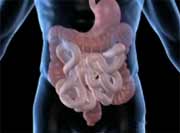- 8 Ways to Increase Dopamine Naturally
- 7 Best Breads for Maintaining Stable Blood Sugar
- Gelatin vs. Collagen: Which is Best for Skin, Nails, and Joints?
- The Long-Term Effects of Daily Turmeric Supplements on Liver Health
- Could Your Grocery Store Meat Be Causing Recurring UTIs?
- Are You Making This Expensive Thermostat Error This Winter?
- Recognizing the Signs of Hypothyroidism
- 10 Strategies to Overcome Insomnia
- Could Artificial Sweeteners Be Aging the Brain Faster?
- Techniques for Soothing Your Nervous System
Colon Cancer Hits Younger Adults Especially Hard, Study Finds


TUESDAY, Oct. 1Younger adults with colorectal cancer that has spread (metastasized) to other areas of the body have a higher risk of disease progression and death than middle-aged patients, a new study finds.
Colorectal cancer in elderly patients is also more aggressive than it is in the middle-aged, the study says.
Researchers analyzed data from more than 20,000 patients who took part in 24 phase 3 clinical trials for colorectal cancer. Patients younger than 40 years old were 30 percent more likely to die from their disease than 57-year-old patients. And compared to 61-year-olds, patients younger than 40 had a 28 percent higher risk of their disease progressing and spreading during a one-year follow-up.
The investigators also found that the oldest patients had a 72 percent higher risk of death and a 19 percent higher risk of their cancer spreading than patients who were ages 57 and 61, according to the study, which was presented Sunday at the 2013 European Cancer Congress in Amsterdam.
Further research is needed to determine why colorectal cancer in younger patients appears to be more aggressive, said study author Dr. Christopher Lieu, an assistant professor at the University of Colorado.
“Although colorectal cancer occurs in only 4.6 percent of patients who are younger than 50, the incidence of the disease has been increasing at a rate of 1.5 percent per year from 1992 to 2005 in this age group,” he said in a European CanCer Organization
(ECCO) news release.
“The most dramatic increases have been observed in the 20-29 year-old group, where there has been an annual 5.2 percent increase in cases in men and a 5.6 percent increase in women, and in the 30-39 year-old group, where there has been an annual 3 percent increase in men and a 2 percent increase in women,” he noted.
The reasons for the increasing rates of colorectal cancer in younger adults aren’t known, but genetics, environmental factors, fewer early cancer detections in this age group or a combination of these factors are thought to play a role, according to Lieu.
“While colorectal cancer overwhelmingly occurs in older people, we must not forget that people younger than 50 can develop it too,” Cornelis van de Velde, president of ECCO, said in the news release.
This study “is important as it shows that these younger patients may have a worse prognosis if their disease has metastasized,” van de Velde added. “Doctors and patients need to be aware of this so that they are alert to the early symptoms of colorectal cancer, and treatment can be given before the disease has started to spread.”
Data and conclusions presented at meetings are typically considered preliminary until published in a peer-reviewed medical journal.
More information
The American Cancer Society has more about colorectal cancer.
Source: HealthDay
Copyright © 2026 HealthDay. All rights reserved.










